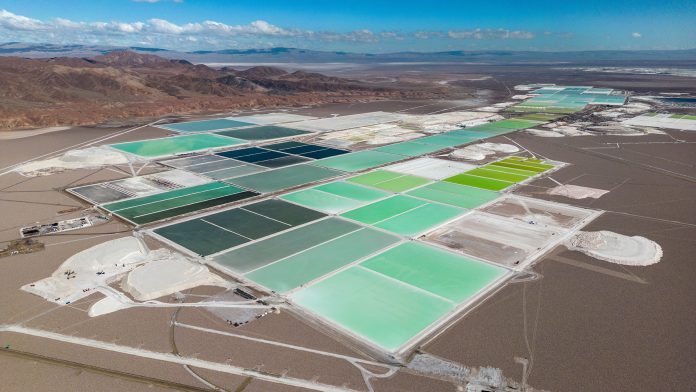Lithium, the ‘white gold’ of the 21st century, has become crucial in today’s high-tech world.
Its unique characteristics, such as high energy density and excellent electrochemical properties, make lithium indispensable in producing rechargeable batteries that power everything from smartphones to electric vehicles.
In this context, Chile emerges as a significant player due to its vast lithium reserves, making it one of the leading suppliers globally.
However, understanding which companies source their lithium from Chile requires delving deeper into the web of global supply chains.
This article aims to untangle this complex network by focusing on major tech corporations and emerging electric vehicle manufacturers taking advantage of Chile’s rich lithium deposits.
Furthermore, the factors influencing these companies to acquire lithium from Chile will be unveiled.
The importance of lithium in today’s market
Lithium has ascended to unparalleled prominence in the modern market, its demand surging as industries across the globe seek this invaluable resource, often mined from the rich veins of Chile’s geology.
This surge in demand can be largely attributed to the growing need for lithium-ion batteries in various sectors, including automotive and electronics. However, concerns have been raised regarding lithium’s environmental impact alongside its escalating demand.
The role of Chile in global production
As a key player in global lithium production, Chile’s vast salt flats attract numerous multinational corporations seeking to secure supplies of this vital component for electric vehicle batteries and high-tech devices.
The South American nation holds the world’s largest reserves of lithium, accounting for about 52% of the total available lithium resources globally.

© shutterstock/hecke61
This, coupled with Chile’s mining policies that favour foreign investment, makes it a preferred destination for companies such as Tesla, Albemarle Corporation and SQM S.A., who are looking to tap into its abundant lithium resources.
Lithium in Chile is primarily extracted using evaporation methods from brine pools. A few aspects worth noting regarding this process include:
- Chile’s Mining Policies: These rules have been designed to facilitate foreign investments while ensuring sustainable extraction practices;
- Lithium Extraction Methods: Brine evaporation is the most common method used in Chile. It involves pumping saline groundwater up from beneath the Salar (salt flat) and allowing it to evaporate in large ponds, leaving behind concentrated amounts of lithium; and
- Environmental Impact in Chile: Despite its economic benefits, this extraction process has raised environmental implications, including water scarcity. Due to this, lithium exploration companies are implementing sustainable methods, such as Direct Lithium Extraction (DLE).
While these multinational corporations contribute significantly to Chile’s economy through their investments and operations, there are considerable challenges associated with managing the environmental impact and addressing indigenous rights issues surrounding this highly profitable industry.
Henceforth, an effective balance between commercial interests and social responsibility becomes crucial for maintaining sustainable operations in this sector without exacerbating existing socio-environmental tensions.
Major tech corporations sourcing lithium from Chile
Major tech conglomerates are increasingly turning to the vast lithium reserves of this South American nation to fuel their burgeoning demand for electric vehicle batteries and high-tech electronics.
These corporations, which include Tesla, Apple, Samsung, and Panasonic, source a significant portion of their lithium from Chilean mines due to the country’s abundant reserves and advanced extraction techniques.
However, these operations are subject to stringent Chilean mining regulations designed to protect the environment and promote sustainable practices in the lithium industry.
The surge in global demand for lithium has led to rapid advancements in extraction techniques, with many companies investing in tech innovations to improve efficiency and reduce environmental impact.
Corporate social responsibility also plays a key role in these efforts as companies strive to comply with local mining laws and minimise harm to local communities and ecosystems.
The trend towards more responsible sourcing reflects broader shifts within the lithium market, with stakeholders increasingly recognising the need for sustainable production methods.
Overall purchase trends suggest that reliance on lithium in Chile will likely persist, given current market dynamics and projections for increasing global demand for high-capacity rechargeable batteries used in various sectors, including automotive manufacturing, consumer electronics, and renewable energy storage systems.
Emerging electric vehicle manufacturers and Chile’s resources
Emerging manufacturers of electric vehicles are carving out a path to the resource-rich landscapes of South America, notably seeking out the vast lithium reserves in Chile to fuel their ambitions.
However, this surge in demand is not without challenges as companies navigate through complex Chilean mining regulations that govern access and extraction processes.
These regulations are designed to protect both local economies and fragile ecosystems from potential adverse impacts associated with mining activities.
Simultaneously, emerging electric vehicle manufacturers are also contributing significantly towards electric vehicle innovation, constantly exploring ways to optimise battery technologies where lithium stands as a crucial component.

To support this growing industry while simultaneously protecting its resources, Chile has formulated specific export policies aimed at controlling the flow of mined lithium outside its borders.
These measures ensure that while serving global demands for lithium, they do not compromise on their natural assets or socio-economic stability within their territories.
Thus, it becomes evident that balancing industrial growth demands and maintaining environmental sustainability remains pivotal for countries like Chile, which stands at the frontiers of global lithium supply chains.
Factors influencing the choice of Chilean lithium
Several factors have played pivotal roles in positioning the South American nation as a desirable destination for procuring this critical element.
Chile’s mining policies, particularly those related to lithium, have been instrumental in attracting international companies. The country has established comprehensive regulations that not only streamline the process of obtaining mining rights but also provide safeguards for local communities and environments.
Furthermore, Chile is known for its advanced lithium extraction methods, which significantly enhance yield and efficiency, thereby making it an attractive source of lithium.
Local economic benefits provided by the lithium industry are also a salient aspect that appeals to companies seeking resources from Chile. Profits derived from lithium mining contribute substantially to regional development initiatives and employment opportunities within local communities.
Although there are ongoing discussions regarding the distribution of these benefits among different segments of society in Chile, the overall effect on economic growth is undeniable.
As such, despite potential challenges or risks associated with sourcing lithium from specific regions worldwide, many firms continue to choose Chile due to its combination of favourable conditions, including progressive mining policies, effective extraction methods, and minimised environmental impacts through regulation and technology development alongside notable local economic advantages.










